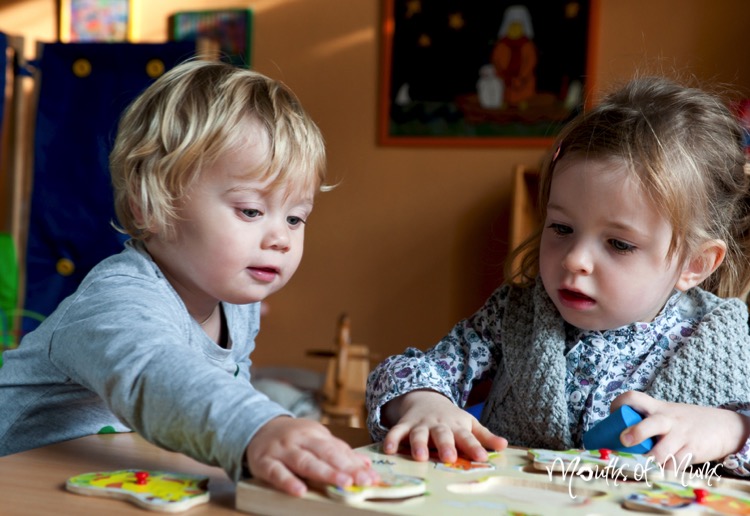Today, a growing number of parents appreciate the critical importance of promoting early childhood brain development.
Many experts believe that play activities provide one of the most significant ways for babies and toddlers to learn and develop healthy emotional interactions with others.
“Use it or lose it”
Perhaps you’ve heard the old gymnastics class joke: “use it or lose it”? This phrase inspires millions of adults to stretch, bend, and move more vigorously as they struggle to train the human body. Most physical fitness coaches support exercising entire muscle groups in order to develop improved strength and tone. Just as muscles won’t become stronger without daily use, and many in fact grow flabby without regular physical activity, the human brain also needs stimulation in order to form and maintain important neural pathway connections.
Scientists who study babies now urge parents to engage their youngsters in challenging puzzle games at young ages, in order to stimulate early childhood development. Babies and toddlers in particular benefit from play activities that encourage cognitive, physical and emotional growth.
Solving puzzles
Millions of parents today understand the vital importance of providing toddlers with engaging toys and puzzles. Toy designers recently created some safe, incredibly beneficial, wooden jigsaw puzzles for little children.
Many of these play items display vivid colours and interesting shapes and textures. They offer hours of fun for youngsters. These games please parents because of their beneficial side effects on early childhood development.
An illustration
Of course, at first glance it seems hard to appreciate from an adult perspective that a toddler learning how to solve a snake cube puzzle has accomplished a significant goal. Yet many educators urge parents to consider the issue from a baby’s perspective.
The interesting shapes, colours and wood grains on these toys promote the development of enhanced language skills, as children learn the words that describe these aspects of the toy. A snake cube differs from a snake circle or triangle, for instance.
As babies manipulate the wooden pieces, working by trial and error to fit them into place, they also improve their hand and eye coordination. A little one may gain a better sense of spatial depths through this process. Very importantly, with every successful puzzle placement, the child gains the emotional satisfaction that comes with reaching a goal. Playing with puzzle games in this way contributes to the development of self-esteem.
A platform for further growth
Yet solving a simple snake cube puzzle may hold even more benefits for youngsters, according to some child development experts. By encouraging children to play this type of game with others, parents promote social learning skills. Toddlers develop more patience and they become willing to cooperate with other children in solving challenges.
Puzzle solving even provides a platform for gaining academic skills just a few years later. The deductive reasoning abilities which assist children in fitting differently shaped wooden pieces into place offer a great learning foundation for better maths skills and problem solving talents during primary school.
An intelligent solution
What conclusion can parents draw from this field of research? One practical benefit seems clear. Furnish babies and toddlers with the opportunity to play puzzle games using age appropriate, safe toys. Supervise them during this activity. Your presence will encourage them and promote healthy early childhood development.
Do your children enjoy playing with puzzles? Please share in the comments below.
Image courtesy of Shutterstock.com




















-

-
-
meedee said
- 12 Sep 2021
-

-
-
ella12 said
- 06 Sep 2016
-

-
-
mom94125 said
- 02 Sep 2016
-

-
-
Threelos said
- 30 Apr 2016

-

-
-
mom153507 said
- 30 Apr 2016
-

-
-
rovermum said
- 07 Mar 2016
-

-
-
mom101628 said
- 05 Mar 2016
-

-
-
curlytops said
- 05 Mar 2016
-

-
-
mom134803 said
- 05 Mar 2016

-

-
-
mom93821 said
- 03 Mar 2016
-

-
-
mum4107 said
- 03 Mar 2016
-

-
-
june11 said
- 02 Mar 2016
-

-
-
mom90758 said
- 02 Mar 2016
-

-
-
mom160421 said
- 02 Mar 2016
-

-
-
mom165081 said
- 02 Mar 2016
-

-
-
Nas01 said
- 02 Mar 2016
-

-
-
mom71820 said
- 02 Mar 2016
Post a comment10:11 am
2:58 pm
5:49 pm
9:45 pm
6:05 pm
4:07 pm
3:42 pm
12:01 pm
7:38 am
9:49 pm
-

-
-
mom93821 replied
- 04 Mar 2016 , 7:04 am
Reply6:02 am
10:27 pm
6:33 pm
5:51 pm
3:37 pm
1:35 pm
12:23 pm
To post a review/comment please join us or login so we can allocate your points.